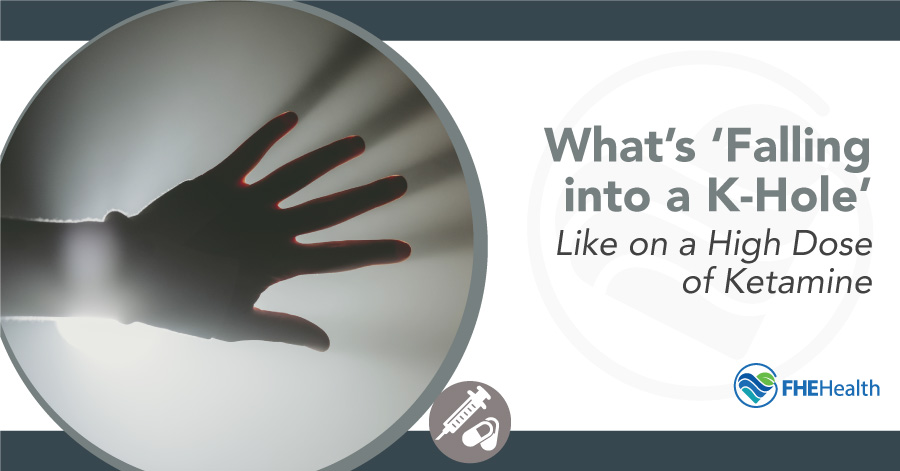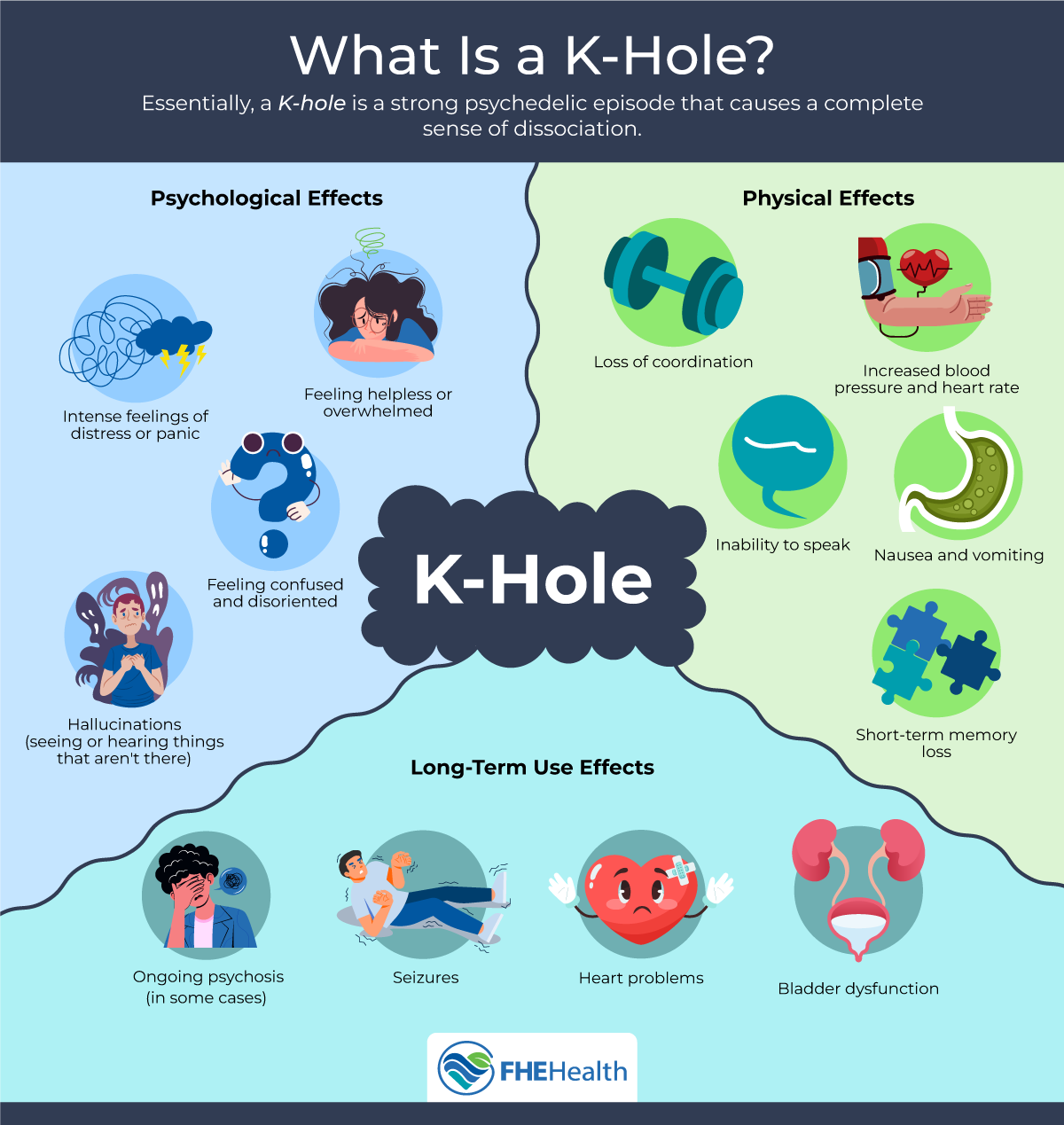
What does a K-hole feel like? This overview on ketamine breaks down everything you should know about this intense narcotic.
LSD (acid) and magic mushrooms (psilocybin) are well known for their psychedelic properties, but they aren’t the only drugs people use recreationally to achieve a trip-like state. Ketamine, also known as Special K or Vitamin K, has emerged over the last few decades as an increasingly popular drug that produces a psychedelic experience.
When abused, ketamine can be quite dangerous. A high dose of ketamine comes with various risks some users refer to as “falling into a K-hole.” Wondering what a K-hole feels like? Keep reading to find out.
What Does a K-Hole Feel Like?
Increasingly abused as a club or party drug, ketamine produces psychedelic trips during which users experience changes in perceptions of reality. At a high dose, these trips can intensify, leaving users experiencing vivid psychedelic highs but also physically unresponsive and unable to function. A ketamine hole, or K-hole, isn’t a sought-after experience but typically occurs accidentally because of an elevated dose.
People who fall into a K-hole often experience the following:
- Intense feelings of distress or panic
- Feeling helpless or overwhelmed
- Hallucinations (seeing or hearing things that aren’t there)
- Feeling confused and disoriented
- Loss of coordination
- Increased blood pressure and heart rate
- Nausea and vomiting
- Short-term memory loss
- Ongoing psychosis (in some cases)
How Long Does a Ketamine High Last?
How quickly you’ll feel the effects of ketamine depends on how you take it. On average, someone will experience a ketamine high in:
- 1 minute when injected
- 5-15 minutes when snorted
- 30 minutes if ingested
The average length of a K-hole is between 10 minutes and an hour.
The Dangers of Abusing Ketamine
Ketamine can cause a person to feel numb and unable to speak or move. However, in nonmedical settings, the risks associated with losing mobility and other functions mean a person can quickly become injured and be unable to help themselves or call for help.
People who abuse ketamine for an extended period can develop heart problems, seizures and bladder dysfunction. Additionally, ketamine abuse can lead to “K-hole flashbacks.” This is when someone experiences cognitive decline, such as memory problems, depression and delusional thinking, even when they’re not high on the drug.
Lastly, Ketamine is also addictive and can be fatal. The risks of fatality increase when the drug is used with alcohol or other drugs. Individuals who abuse ketamine long-term are at a higher risk of experiencing a K-hole.
What Are the Properties of Ketamine That Lead to Its Effects?
Ketamine functions as a dissociative anesthetic. In medical settings where the drug is used as an anesthetic, the ketamine dissociative state is helpful as it allows patients to feel detached from themselves and what’s going on around them while experiencing some sedation.
Ketamine is FDA-approved for use in hospitals or veterinary clinics, where it’s highly controlled and therefore considered safe. However, outside of a medical setting, this drug is unsafe and comes with serious risks to both physical and mental health.
What Is Research Saying About Regulated Doses of Ketamine in Controlled Settings for Treatment?
Now that you know what a K-hole feels like — and understand how bad the K-hole experience can be — you may be wondering if there are any positive reasons to take this drug.
The answer is slightly complicated. This drug, however, is prescribed by doctors and veterinarians as an anesthetic and has recently been used to treat drug-resistant depression in humans with success. In medical settings, ketamine is highly supervised to ensure safety.
Although ketamine is approved for medical use in hospitals to treat people, it’s most frequently used in veterinary practices. However, that may be changing as new therapeutic uses for ketamine are developed.
Like opioids and other prescription drugs that are widely abused, ketamine offers benefits to people when prescribed by doctors as a medical treatment. Its role in anesthesia is essential, particularly for patients who don’t require or can’t tolerate a stronger anesthetic. Ketamine can be prescribed before, during or even after surgical procedures to provide sedative effects.
Benefits and Uses of Ketamine as a Medical Treatment
When prescribing ketamine as an anesthetic, health care providers will inject the drug into a muscle or may administer it via an intravenous line. Many surgeons favor the use of ketamine because it doesn’t require the patient to receive oxygen too. Ketamine doesn’t decrease blood pressure or lower a person’s breathing rate, which makes it a safer type of anesthetic than stronger options.
Ketamine is often favored as an anesthetic for humans for surgeries and procedures such as:
- Skin grafts
- Burn treatments
- Cardiac catheterization
- Orthopedics
- Ear, nose or throat procedures
Other Therapeutic Uses of Ketamine
However, ketamine’s use as an anesthetic isn’t the drug’s only use in the medical setting. Patients who have a severe form of epilepsy known as epilepticus SE, which may cause brain damage or death, may be prescribed ketamine to control their seizures. The drug is administered in the hospital setting. While not the first drug choice for this type of treatment, it’s often resorted to after several other drugs have been unsuccessful.
With its dissociative properties, ketamine is sometimes prescribed in low doses as an analgesic. Ketamine appears to offer pain relief, which makes it a good choice for post-surgical care in some cases, particularly after minor surgical procedures.
Ketamine has also been used successfully to treat depression, reduce symptoms of post-traumatic stress disorder, alleviate suicidal thoughts and treat some substance use disorders. While its use in some areas of mental health treatment is largely controversial (especially as a substance abuse therapy), it’s garnering increasing medical support, especially for its role in treating depression.
Many people suffer from treatment-resistant depression. Roughly 8.3% of Americans are diagnosed with major depressive disorder (MDD). Of these, anywhere from 12%-55% may not respond to treatment like antidepressant medications, but research has found that many patients prescribed ketamine have experienced relief from their depression or suicidal thoughts.
Today, in fact, many medical professionals prescribe ketamine to patients with depression when antidepressants don’t offer relief. The ketamine is administered as a nasal spray or intravenously in various medical settings. (Learn more about ketamine infusions at FHE Health.)
Ketamine has proved itself a powerful option in the treatment of depression when other medications aren’t working. Usually, patients begin to experience relief from their depression after three ketamine infusions. Even so, studies are still ongoing, and doctors who prescribe ketamine for depression continue to prescribe antidepressants for the patient as well as cognitive behavioral therapy.
Ketamine is a helpful drug in the medical arena with its various therapeutic uses. In time, more uses may be found as researchers continue to study the drug’s effects on the brain and body. However, ketamine isn’t suitable for every patient. For example, ketamine isn’t recommended for patients over 65. Additionally, ketamine is only regarded as a safe therapeutic option when delivered by qualified health care providers in medical settings.
When used recreationally, ketamine is associated with health risks, including death. Users who fall into a K-hole may not come out as they went in. Ketamine has also been implicated as a date rape drug owing to the paralyzing effects it can produce. The drug also has addictive properties. Someone who abuses ketamine can become addicted to it and is unlikely to stop using it without formal addiction treatment.
Get Help for Ketamine Abuse and Addiction
If you’re abusing ketamine or suspect you may have become addicted to this drug, contact FHE Health to get help right away. Drugs like ketamine can alter the brain’s chemistry, making it difficult to stop using the drug without treatment.
Frequently Asked Questions About Ketamine and “K-Holes”
Q: What is the typical duration of a “K-hole” experience?
A: Most people find the peak effects last anywhere from 10 minutes to an hour, but because ketamine warps your sense of time so much, a few minutes can feel like an eternity. If you’re snorting it or taking it orally, it can take 30 minutes to even kick in. That delay can cause users to think it’s not working, take more, and then get hit way harder than they planned by the drug.
Q: Why is doing it at home riskier than at a clinic?
A: In a clinic, you’ve got a professionalcalculating your dose based on your weight and keeping an eye on your heart rate. When people use it recreationally, they’re usually just guessing the dose. The real danger of a K-hole is that you basically become paralyzed. If you aren’t in a safe, supervised spot and something goes wrong, you can’t move to help yourself. Plus, you never truly know the purity of what you’re getting on the street, making for several different risk factors associated with unsupervised use.
Q: Is it possible to get stuck in a K-hole forever?
A: No, that’s a common myth. Your liver is actually pretty efficient at processing ketamine; it usually clears out of your system within an hour or so. Once the drug metabolizes, you’ll come back to reality. You might feel a bit “off” or “fuzzy” for a while afterward while your brain recalibrates, but the physical state itself isn’t permanent.
Q: What are the risks regarding dependency and physical health?
A: The biggest issue is how fast your tolerance builds. You’ll find you need more and more just to get the same feeling, which can lead to dependency. Physically, frequent use is brutal on the bladder, asit can cause ketamine cystitis, which is incredibly painful and sometimes permanent. It’s also hard on your heart and blood pressure if you’re using it constantly.
Q: How can the sensation of a “K-hole” be described?
A: “Detachment” is the easiest way to describe a “K-Hole.” It’s like your mind and body have been unplugged from each other. You lose control of your limbs, and your sense of “self” starts to blur or disappear entirely. Some people find the visuals and the silence peaceful, but for others, losing that much control is terrifying.
Q: What if I start to panic while it’s happening? Will I be able to talk or ask for help?
A: Probably not, and that’s the part that scares people the most. Because a K-hole causes that “disconnection” between your brain and your muscles, your voice usually won’t work even if you’re trying to scream or call out. If you feel panic rising, you have to try to lean into the sensation rather than fight it. Fighting it usually makes the anxiety worse. This is why “set and setting” are so hugely important—you need to be in a comfortable spot with a person you trust nearby who knows you’re “going under.” Just knowing someone is there to keep you breathing and safe can prevent a bad experience from turning into a full-blown traumatic one.







